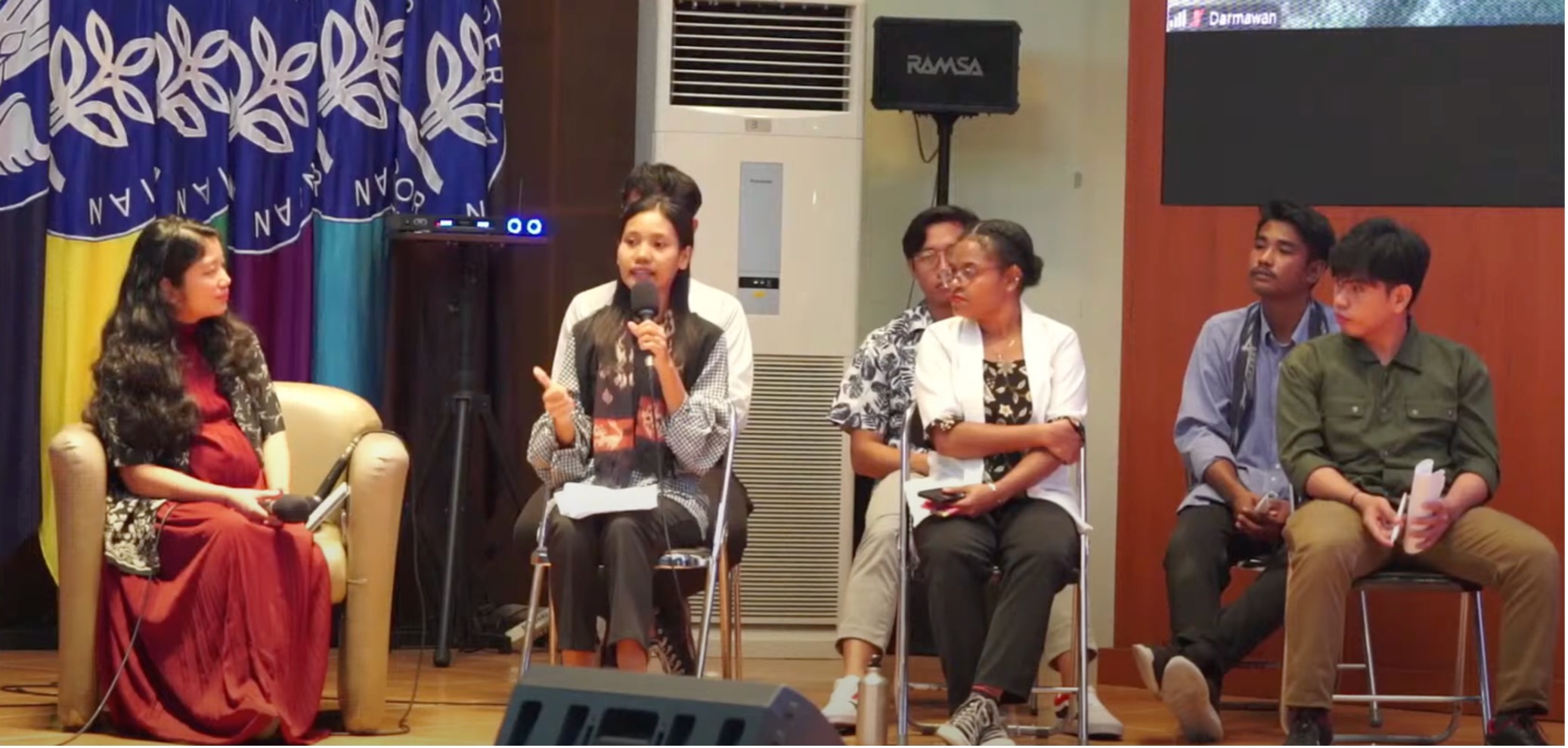
One of the sharing sessions held in Bogor as part of the Youth Food Systems Dialogue and Movement. (Doc.CTSS)
- admin
- 25 June 2024
- Feature
Sustainable Food Systems, Grown From Traditional Knowledge
From 29-30 May 2024, the Samdhana Institute took part in a national workshop entitled ‘Youth Food Systems Dialogue and Movement 2024: Promoting Local Knowledge for Sustainable Food Systems in Indonesia’. Hosted at IPB University in Bogor, the event was part of a programme that aims to revive local, sustainable food systems in Indonesia, with particular focus on passing traditional wisdom down to the next generation.
One of the keynote speakers at the event was Hilmar Farid, Indonesia’s Director General of Culture at the Ministry of Education, Culture, Research and Technology. Speaking via Zoom, he emphasized the centrality of Indigenous knowledge to sustainable food systems, as a counterbalance to the overexploitation of natural resources and destruction of the environment emanating from unchecked global modernisation.
A Rift at the Heart of Global Food Systems
“The current unsustainable global food system was formed in the modern era, its basis is knowledge and technology,” explained Mr Farid, who pointed to the use of fertilizer as an example of modern technological innovations that have disrupted natural cycles and led to the excessive exploitation of natural resources. “This is called a ‘metabolic rift’,” explained the Director General, “which ultimately forms (the basis of) our global food system,” he added.
Mr Farid insists that food systems in Indonesia need a rethink. With the diversity and abundance of foods available, the nation has the potential to become a sustainable food hub. “Many movements have emerged and support each other,” noted Farid, drawing attention to areas such as organic farming, permaculture, agroecology, barter markets, gastronomy, slow food and public health. “(These movements) may have started as a lifestyle choice, but – if developed further – they could become a way of life,” he concluded.

Traditional Solutions for Sustainable Futures
One solution to these issues involves returning to local food sources. There are ample opportunities for individuals to support local agriculture by shopping and eating local – Indonesia is home to over 700 Indigenous communities, each with their own food systems, rooted in traditional knowledge.
“The food systems of traditional communities are closely related to culture,” explained Arif Satria, who is Chancellor of IPB University. “Therefore, community food systems should be considered extremely valuable,” he added, highlighting local knowledge of marine resources, forest plants and traditional medicines. Mr Satria expressed his hopes that the event would catalyse the distribution of traditional knowledge more broadly in modern society.
The Youth Food Systems Dialogue and Movement programme has been running since 2023. In that time, it has expanded to incorporate a wide network of civil society organizations, academics and young people from Bogor, Yogyakarta, Papua and East Sumba. Each of these partners has been documenting local food knowledge and practices in their respective regions.

Learning From the Field
The event drew together a series of lessons learned, quite literally, from the field. One of the university students from West Java with assistance from Bogor-based partners, Koalisi Rakyat Kedaulatan Pangan (KRKP), gain agricultural insights from Urug Village in West Java, while KOPPESDA and Wira Wacana Christian University from East Sumba shared knowledge from the Marapu Indigenous people, who engender social solidarity and kinship by sharing food between coastal and mountain communities.
Student from Yogyakarta with assistance from an organisation based in Yogyakarta called Critical Pedagogi Indonesia, shared his experiences from Wotawati Village in the Bengawan Solo Purba valley, where local wisdom has been integral to resolving water scarcity and combating climate change. Next, delegates from the Cenderawasih University shared the story of Indigenous Women who guard the Hutan Perempuan or Women's Forest, a mangrove forest in Papua. They face economic and developmental challenges, along with water and waste pollution, which have impacted the productivity of their forest.
“Indigenous peoples provide a message to all of us,” explained Damayanti Buchori, Director of the Center for Transdisciplinary and Sustainability Sciences at IPB University. In her speech, she observed that “food is not only a source of livelihood, but part of cultural identity; not just nutritional fulfilment and a good taste in the mouth, but also cultural value, identity.” Reflecting on the event, Ms Buchori expressed her hopes that these meetings can precipitate the transformation of Indonesia's food systems. “Don't overlook local wisdom, Indigenous communities, and small farmers,” she said. “In particular, don't leave young people behind.”